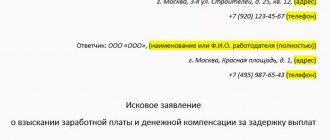Why are consumer protection authorities needed? What are their functions? Which one should you choose to protect your rights? Let's look at these questions in more detail.
Close attention on the part of the state to ensuring the protection of the rights of the most vulnerable party to a sales contract and the implementation of granted rights implies the presence of a system of consumer rights protection bodies. We are talking, first of all, about state bodies for protecting consumer rights and about public control over the observance of such rights.
Right to product quality
The right to quality ensures that the consumer extracts the declared consumer properties from the product (work, service).
Any product or service must comply with the stated characteristics. If the purchased goods, work, or service do not have a clear description, then they must be suitable for the purposes for which they are usually used (Article 4 of the Law of 02/07/1992 N 2300-1).
The presence of unspecified defects in the goods is the basis for returning the goods and submitting the following demands to the seller (manufacturer, authorized organization or authorized individual entrepreneur, importer) within the established time frame: compensation for losses caused as a result of the purchase of goods of inadequate quality, compensation for moral damages, and also pay a penalty.
Consumer Encyclopedia
Memo for consumers. Expertise in consumer protection cases
Expertise, based on the provisions of the current legislation of the Russian Federation, can be defined as an action consisting of conducting research and giving an opinion by an expert on issues the resolution of which requires special knowledge in the field of science, technology, art or craft.
In turn, an expert’s opinion is a written document reflecting the progress and results of research conducted by the expert.
In cases of consumer rights protection, the expert’s opinion is quite often the key evidence, since assessing the quality of the sold product (work, service) usually requires special knowledge.
An examination carried out by the seller (manufacturer, authorized organization, importer).
First of all, it should be noted that the possibility of conducting an examination is provided for both by the Law of the Russian Federation “On the Protection of Consumer Rights” and by the Civil Procedure Code of the Russian Federation.
However, these regulations refer to different actions. The Law of the Russian Federation “On the Protection of Consumer Rights” establishes that if defects are discovered in a product and the consumer makes any demand, the seller (manufacturer), authorized organization or authorized individual entrepreneur, importer are obliged to accept goods of inadequate quality from the consumer and, if necessary, carry out a quality check goods. The consumer has the right to participate in checking the quality of the product.
In the event of a dispute about the reasons for the occurrence of defects in the goods, the seller (manufacturer), an authorized organization or an authorized individual entrepreneur, or the importer are obliged to conduct an examination of the goods at their own expense. The consumer has the right to be present during the examination of the goods and, in case of disagreement with its results, to challenge the conclusion of such examination in court.
That is, the Law of the Russian Federation “On the Protection of Consumer Rights” provides for the possibility of conducting an examination as part of the consideration of the consumer’s claim after a quality check and only in the event of a dispute about the reasons for the occurrence of defects in the product (for example, if the consumer claims that the product is defective, and the seller claims that the defect manifested itself as a result of the actions of the consumer).
Moreover, if as a result of the examination of the goods it is established that its defects arose due to circumstances for which the seller (manufacturer) is not responsible, the consumer is obliged to reimburse the seller (manufacturer), authorized organization or authorized individual entrepreneur, importer for the costs of conducting the examination, as well as related its carrying out the costs of storing and transporting goods.
When talking about the examination of goods within the framework of the Law of the Russian Federation “On the Protection of Consumer Rights”, the following aspects should be taken into account.
Firstly, if its implementation does not resolve the dispute, the conclusion in the framework of the consideration of the case in court will be assessed as ordinary written evidence, and not as an expert opinion within the meaning of procedural legislation.
Secondly, conducting an examination as part of the consideration of a consumer’s claim is not a prerequisite for going to court. Moreover, this delays the resolution of the dispute, and therefore, in the vast majority of cases, both entrepreneurs and consumers do not take advantage of this opportunity and the procedure for considering consumer claims is as follows.
Forensic examination in cases of consumer rights protection.
The Civil Procedure Code of the Russian Federation establishes that if issues arise during the consideration of a case that require special knowledge in various fields of science, technology, art, craft, the court appoints an examination.
When considering cases on the protection of consumer rights, such questions, as a rule, are questions regarding the quality of the product (work, service), including the reasons for the manifestation of deficiencies in the product (work, service).
It is the court that determines the institution (a specific expert) that will be entrusted with conducting the examination, as well as the questions that need to be answered.
However, the parties and other persons participating in the case have the right to ask the court to order an examination in a specific forensic institution or to entrust it to a specific expert; challenge the expert; formulate questions for the expert; familiarize yourself with the court’s ruling on the appointment of an expert examination and the questions formulated therein; get acquainted with the expert's opinion.
Consumers are strongly encouraged to exercise the right granted and propose expert questions and expert institutions to the court that are trusted and reputable. Such proposals should be made in a written request.
Expertise in cases of consumer rights protection is carried out, as a rule, outside a court hearing at the location of the object of investigation or at the location of the expert institution. Persons participating in the case have the right to be present during the examination, except in cases where such presence may interfere with the research.
The parties, including the consumer, should not in any way interfere with the conduct of the study, since avoiding participation in the examination and failure to provide experts with the necessary materials and documents for the study may result in the loss of the case.
After conducting the study, the expert gives a written opinion and sends it to the court.
The expert's report must contain a detailed description of the research conducted, the conclusions drawn as a result and answers to the questions posed by the court.
If necessary, the expert can be questioned at a court hearing, where each party can ask questions to the expert.
In cases of insufficient clarity or incompleteness of the expert’s conclusion, the court may order an additional examination, entrusting it to the same or another expert.
In connection with doubts that have arisen about the correctness or validity of a previously given conclusion, or the presence of contradictions in the conclusions of several experts, the court may order a repeat examination on the same issues, the conduct of which is entrusted to another expert or other experts.
Experts from the Federal Budgetary Institution of Health “Center for Hygiene and Epidemiology in the Lipetsk Region” have significant experience in conducting examinations appointed both as determined by the courts of the judicial system of the Russian Federation, and on the basis of appeals from citizens and legal entities.
It is possible to carry out:
- Furniture examination; complex household appliances, including electrical and electromechanical devices; examination of vehicles, their parts, assemblies and assemblies
- Expertise of work on finishing premises (quality of finishing work), volumes and costs of construction, installation and repair work, reasons for flooding (flooding) of apartments (premises); examinations to determine the amount of damage caused to real estate by flooding (flooding), fire, etc.; examinations of the technical condition of redesigned and refurbished apartments and houses; other types of construction and technical expertise.
- Examination of electronic devices (including smartphones), computer equipment
Expert opinions of the Federal Budgetary Institution of Health "Center for Hygiene and Epidemiology in the Lipetsk Region" are an authoritative, legally significant document that is recognized as evidence by the courts of the judicial system of the Russian Federation of any instance.
Right to quality of service
Similar rights are granted to the consumer in case of provision of low-quality services, violation of deadlines for the completion of work (provision of services) or in the case of performance of work with defects (Article 15, paragraph 1 of Article 18, Article 19, paragraph 1 of Article 23, Art. Articles 28, 29 of Law No. 2300-1).
The consumer’s right to product quality also includes the following rights (Article 6, paragraph 1 of Article 18, Article 21, paragraph 1 of Article 29 of Law No. 2300-1):
• for repair and maintenance of the product during its service life;
• replacement of goods of inadequate quality with goods of proper quality;
• a proportionate reduction in the value of the goods in the event of detection of defects in the goods that the seller did not report;
• free elimination of product defects;
• refusal to execute the sales contract and return of the amount paid for the goods.
The consumer’s right to quality of work (service) includes, in particular, the following rights (Clause 1, Article 29 of Law No. 2300-1):
• for the free elimination of deficiencies in the work performed (service provided), the free production of another item or the repeated performance of the work;
• reduction in the price of work performed (service provided) if deficiencies are discovered in it.
Criminal liability for violation of consumer rights
The bottom line: a fine to the state or a prison sentence for unsafe goods and services if people were hurt or killed because of them. Applies regardless of civil liability.
Who is at risk: a specific person - the director of a company or an entrepreneur.
Who decides: first, investigators initiate a criminal case under Art. 238 of the Criminal Code of the Russian Federation and prove the guilt of the accused of a crime. Then the materials are sent to the court for sentencing.
The punishment is:
Trade, provision of services and performance of work in non-compliance with safety requirements or forgery of quality documents - from a fine of 300,000 rubles to ten years in prison under Art. 238 of the Criminal Code of the Russian Federation.
Right to product safety
The safety of a product (work, service) presupposes its safety for life, health, consumer property and the environment under normal conditions of its use, storage, transportation and disposal, as well as the safety of the process of performing work (providing a service) (preamble of Law N 2300-1) .
The consumer has the right to ensure that the product (work, service) does not cause harm during its service life or shelf life, and in their absence - for ten years from the date of transfer of the product (work) to the consumer.
Security is ensured by a system of mandatory requirements enshrined in the legal regulations (clauses 1, 2, article 7 of Law No. 2300-1).
The consumer is guaranteed full compensation for damage caused to life, health or property due to defects or failure to ensure the safety of goods (work, services), as well as in connection with the use of materials, equipment, tools and other means necessary for the production of goods (performance of work, provision of goods). services).
Losses are compensated in excess of the penalty (penalties) established by law or contract. In addition, payment of a penalty and compensation for damages do not relieve the person who has violated the consumer’s right from fulfilling in kind the obligations imposed on him to the consumer (clauses 2, 3 of Article 13 of Law No. 2300-1; clause 31 of the Resolution of the Plenum of the Supreme Court RF dated June 28, 2012 N 17).
Losses caused to the consumer in connection with the recall of goods (work, services) are also reimbursed in full (clauses 2, 5, article 7, clauses 1, 4, article 14 of Law N 2300-1).
Documentation of service provision
Based on the uniqueness of the service as an intangible item, the consumer is primarily interested in formalizing legal relations for its provision.
The agreement must cover all aspects:
- list of declared services;
- volume;
- quality characteristics;
- price;
- deadlines;
- procedure for resolving disputes.
Attention! A legally correctly drawn up contract is the key to full protection of one’s rights in the provision of services of inadequate quality.
The provisions of the legislation protecting the rights of the consumer provide the latter with the opportunity to make demands on the contractor at the stage of receiving the service and upon its completion, during the warranty period and up to two years from the date of acceptance, and real estate claims - within five years (Article 29).
If there is irrefutable evidence of poor quality services, the supplier is not relieved of responsibility even if the warranty period is not specified (clause 4 of Article 29).
Consumer right to information
The consumer is guaranteed the right to demand the provision of necessary and reliable information, in particular (clauses 1, 3 of Article 8, clauses 1 - 1.2 of Article 9, clauses 1, 2 of Article 10, clause 3 of Art. 11, paragraph 4, article 19, paragraphs 2, 3, article 26.1 of Law No. 2300-1):
• about the product (work, service), including the main consumer properties, mandatory confirmation of the product’s compliance with the requirements of technical regulations, price and terms of purchase;
• on the warranty period (if established), service life or shelf life of the product (work), on the rules and conditions for the effective and safe use of the product (work, service);
• about the manufacturer, performer, seller, including name, address, identifiers in the form of OGRN, OGRNIP numbers, information about the license and operating mode;
• deadlines for filing claims regarding product defects.
When concluding sales and purchase agreements and contracts for the performance of work (rendering services), information about their conditions must be brought to the attention of the consumer in a clear and accessible form (Clause 2 of Article 8 of Law No. 2300-1).
The information provided to the consumer about goods (works, services) must ensure the possibility of their correct choice (Clause 1, Article 10 of Law No. 2300-1).
If unreliable or incomplete information led to harm to the life, health and property of the consumer or to an incorrect choice, then the consumer has the right to demand termination of the contract and compensation for harm and losses incurred (clauses 2, 3 of Article 12 of Law No. 2300-1).
Refund for goods
Since online stores practice different methods of paying for goods, options are also possible when returning money to the buyer.
If the buyer paid with a bank card when concluding the transaction, then the funds must be transferred back to the card. A cash refund in such a situation is a gross violation for which the online seller can be punished by the inspection authorities.
If, for example, by that time the client’s card has ceased to be valid or is lost, then the funds must be transferred to another card of the same client. Or to a bank account, at the request of the buyer.
For cash purchases, cash is issued from the store's cash register. Only the cost of the product itself is refunded; you deduct shipping costs from the total amount.
Judicial protection of consumer rights
If the consumer fails to achieve compliance with his rights voluntarily, the corresponding claim is subject to consideration in court at the consumer’s choice (Article 17 of Law No. 2300-1):
• at the location of the organization or at the place of residence of the individual entrepreneur;
• at the consumer’s place of residence or stay;
• at the place of conclusion or execution of the contract.
If the court satisfies the consumer's demands that were not fulfilled by the seller voluntarily, the court collects from the seller a fine in the amount of 50% of the awarded amount (clause 6, article 13 of Law No. 2300-1; clause 46 of the Resolution of the Plenum of the Supreme Court of the Russian Federation No. 17).
Civil liability for violation of consumer rights
The essence: payments to the consumer for low-quality goods and poor service. The liability applies in conjunction with the underlying obligation, for example to return the marriage fee.
Who is at risk: sellers, contractors, manufacturers, aggregator sites.
Who decides how much and what to pay: the entrepreneur must pay the client according to his application. If he doesn’t, the court will force him to pay.
The payments are:
Losses
Losses - any expenses of the client that arose as a result of:
- Purchasing a defective item, ordering a low-quality service - Art. 18 and art. 29 of the Law.
- Damage to property, harm to health or death of a person due to a defect in a product or service - Art. 7 and art. 14 of the Law.
- Incomplete or incorrect description of the goods, errors in price - Art. 12 of the Law.
- Infringement of his rights by the contract in comparison with the law - Art. 16 of the Law.
- Lack of the ability to pay by card, when by law the store is required to have a terminal - Art. 16.1.Law.
- Loss or damage to the material that he transferred to the performer - Art. 35 of the Law.
Moral injury
Money for moral damage to the client is due if the seller has violated something - Art. 15 of the Law. The size is agreed upon. In case of a dispute, the court will decide.
Penalty
The seller, manufacturer, performer pays the client a penalty for violating the following terms:
— Refunds for defective goods or warranty repairs at 1% of the price of the goods per day - Art. 23 Laws.
- Transfer of paid goods at 0.5% of the advance payment per day - Art. 23.1 of the Law.
- Performing work or modifications at 3% of the price of work per day - Art. 28 of the Law.
Penalty in favor of the consumer
If the client turned to the seller, manufacturer or aggregator with a monetary demand, was refused, but the court sided with him, the defendant pays a fine in the amount of half of the awarded amount - Art. 13 of the Law.
Example of civil liability:
The man had his car's engine chip-tuned at a car service center and installed a new exhaust system for 133,500 rubles.
After some time, the car engine stopped. I had to take the car to another service center. There it turned out that the tuning and installation were done poorly. We had to spend 270,500 rubles on repairs.
The man demanded expenses from the car service center. He was refused, and he went to court.
The court supported the customer and ordered the car service to pay:
— refund of payment — 133,500 rubles.
- losses - 270,500 rubles for repairs, 66,000 rubles for examination of defects.
— penalties for returning payment late — 133,500 rubles.
— moral damage — 5,000 rubles.
— a fine in favor of the consumer for refusing to resolve the money issue peacefully — 271,250 rubles.
— lawyer’s fees — 20,000 rubles.
Case No. 33-39471/2018
Consumer rights and Rospotrebnadzor
Consumers also have the right to contact Rospotrebnadzor as a special authorized body in the field of consumer rights protection, which has the right, in particular (Article 40 of Law N 2300-1; Decree of the Government of the Russian Federation dated 02.05.2012 N 412):
• conduct inspections of manufacturers, sellers, performers and other organizations.
• take measures to prevent violations;
• bring the perpetrators to administrative responsibility;
• participate in the judicial protection of the rights of specific consumers;
• file claims for the protection of an indefinite number of persons;
• provide explanations of legislation in the field of consumer protection.
If you decide to repair
Let's say you and the buyer agree that a defective item can be repaired. Please note that delivery of large goods and goods weighing more than five kilograms for repair is carried out at the expense of the seller.
That is, you spend money on picking up an unsuccessful purchase from a client, delivering it to the service center, and then bringing it back. Please consider these costs when deciding whether to repair a product.
If you refuse delivery or payment to the buyer, he has the right to recover these costs from you through the court. The repair period required by law must not exceed 45 days. If due to the fault of the online store the terms increase, be prepared to pay for each day of delay.
A brief algorithm for protecting the interests of ordinary consumers
Everything is quite simple here. Having identified a defect (or realizing that the product does not meet some criteria), the buyer must contact the company (or individual entrepreneur) that sold the product or provided the service. Depending on the situation, he may demand that the product be replaced, defects eliminated, money returned, and so on. Large companies, as a rule, accommodate the buyer halfway even after a verbal request. In addition, many organizations (especially at the federal level) have websites that make it possible to exchange goods, refuse them, or put forward your demands online.
If the product is defective, the law gives the seller fifteen days (for complex goods) to fulfill the consumer's requirements. And when a person is not satisfied with the product according to any criteria (weight, size, color, and so on), the seller is obliged to resolve the dispute within fourteen days. Unless, of course, the purchase is a quality product that cannot be exchanged. We'll talk about this in more detail below.
If the organization refuses to exchange the goods or return the money, you must write a claim and hand it over to a representative of the store (company) against signature, or send it by registered mail to the legal address of the company. Once the seller receives the claim, the deadline begins to count, which is given by law to satisfy the buyer’s requirements. The claim is written in free form. It must contain the seller’s details, consumer data, a statement of the situation, as well as the buyer’s requirements for the seller. The claim is signed by the consumer or his representative. Copies of documents confirming the legitimacy of the requirements are attached to it.
If you do not receive a response within the specified period of time or if the seller does not want to satisfy the requirements, you should go to court. For this purpose, a statement of claim is written. In it, the buyer (or his representative) describes the situation, the essence of his requirements, provides evidence and substantiates his position. Copies of documents are attached to the application: contract, receipts, product operating instructions, copy of the claim, and so on. The state duty for such cases is not paid (Article 17 of the Labor Code).
The buyer can file a claim in court at the seller’s address or at his place of residence. The law provides such an opportunity. It must be remembered that if the amount of claims (excluding possible fines and damages) is less than 50,000 rubles, then such a case is considered by a magistrate. And if the cost of the purchase (or services provided) exceeds this amount, then the case should be considered by a court of general jurisdiction.










